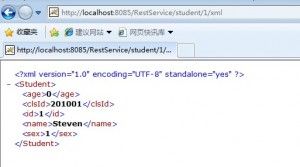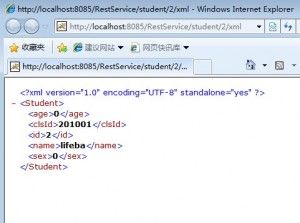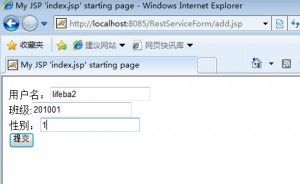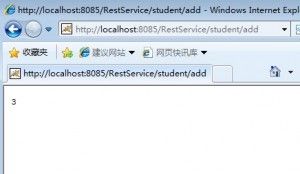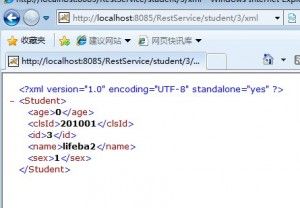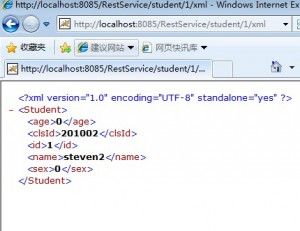RESTLET开发实例(一)基于JAX-RS的REST服务
RESTLET介绍
Restlet项目为“建立REST概念与Java类之间的映射”提供了一个轻量级而全面的框架。它可用于实现任何种类的REST式系统,而不仅仅是REST式Web服务。
Restlet项目受到Servlet API、JSP(Java Server Pages)、HttpURLConnection及Struts等Web开发技术的影响。该项目的主要目标是:在提供同等功能的同时,尽量遵守Roy Fielding博士论文中所阐述的REST的目标。它的另一个主要目标是:提出一个既适于客户端应用又适于服务端的应用的、统一的Web视图。
Restlet的思想是:HTTP客户端与HTTP服务器之间的差别,对架构来说无所谓。一个软件应可以既充当Web客户端又充当Web服务器,而无须采用两套完全不同的APIs。
准备工作
1、Restlet提供了多个版本:Java SE、Java EE、android、Google AppEngine、Google Web Toolkit、Android。
这里我们下载jee版本。
restlet-jee-2.0.6.zip 下载地址:http://www.restlet.org/downloads/2.0/restlet-jee-2.0.6.zip
2、restlet-jee-2.0.6.zip解压到硬盘,这里以%RESTLET_HOME%表示为解压的文件目录。
一、基于JAX-RS的REST服务
JAX-RS (JSR-311) 是一种 Java API,可使 Java Restful 服务的开发变得迅速而轻松。这个 API 提供了一种基于注释的模型来描述分布式资源。注释被用来提供资源的位置、资源的表示和可移植的(pluggable)数据绑定架构。在本文中,学习如何使用 JAX-RS 在 Java EE 环境内实现 RESTful 服务架构的潜能。
1、新建java web project RestService工程
2、%RESTLET_HOME%\lib 复制到 \RestService\WebRoot\WEB-INF\lib 下,并加入工程引用。为了测试方便可以将全部的lib包加入进去。实
际上面,你可以根据实际需要只复制相应的包进去即可。下面的图片是我加入的相关的jar包:
org.restlet.jar这个是必须的,如果是用于JAX-RS发布rest的话,还需要这几个包:
javax.ws.rs.jar
javax.xml.bind.jar
org.json.jar
org.restlet.ext.jaxrs.jar
org.restlet.ext.json.jar
org.restlet.ext.servlet.jar
3、创建Student实体类,用于返回数据。Student使用JAXB绑定技术,自动解析为xml返回给客户端或浏览器。
JAXB是一套自动映射XML和Java实例的开发接口和工具。JAXB使XML更加方便的编译一个XML SCHEMA到一个或若干个JAVA CLASS。可以从
使用 JAXB 进行数据绑定 获得详细介绍。@XmlRootElement(name="Student")
public class Student {private int id;
private String name;
private int sex;
private int clsId;
private int age;public int getId() {
return id;
}
public void setId(int id) {
this.id = id;
}
public String getName() {
return name;
}
public void setName(String name) {
this.name = name;
}
public int getSex() {
return sex;
}
public void setSex(int sex) {
this.sex = sex;
}
public int getClsId() {
return clsId;
}
public void setClsId(int clsId) {
this.clsId = clsId;
}
public int getAge() {
return age;
}
public void setAge(int age) {
this.age = age;
}
}
4、Restlet架构主要是Application和Resource的概念。程序上可以定义多个Resource,一个Application可以管理多个Resource。
创建应用类:StudentApplication 继承了抽象类:javax.ws.rs.core.Application,并重载getClasses()方法。代码如下:
Set<Class<?>> rrcs = new HashSet<Class<?>>();
rrcs.add(StudentResource.class);
绑定了StudentResource。有多个资源可以在这里绑定。你可以有Course等其他更多资源,相应的可以定义为:CourseResource及Course,然后加入rrcs.add(CourseResource.class)。
创建资源类:StudentResource管理Student实体类
@Path("student")
public class StudentResource {@GET
@Path("{id}/xml")
@Produces("application/xml")
public Student getStudentXml(@PathParam("id") int id) {
return ResourceHelper.getDefaultStudent();
}
}
其中:
@Path("student")执行了uri路径,student路径进来的都会调用StudentResource来处理。
@GET 说明了http的方法是get方法。
@Path("{id}/xml") 每个方法前都有对应path,用来申明对应uri路径。
@Produces("application/xml") 指定返回的数据格式为xml。
@PathParam("id") int id 接受传递进来的id值,其中id为 {id}定义的占位符要一致。
和上面类似,我们可以定义返回json格式方法,如下
@GET
@Path("{id}/json")
@Produces("application/json")
public Student getStudentJson(@PathParam("id") int id) {
return ResourceHelper.findStudent(id);
}
其中:
@Produces("application/json") 指定返回的数据格式为json。
5、定义了相应的Resource和Application后,还要创建运行环境。RESTlet 架构为了更好的支持 JAX-RS 规范,定了 JaxRsApplication 类来初始化基于 JAX-RS 的 Web Service 运行环境。
创建运行类:RestJaxRsApplication 继承了类:org.restlet.ext.jaxrs.JaxRsApplication。构造方法代码如下:
public RestJaxRsApplication(Context context) {
super(context);
this.add(new StudentApplication());
}
将StudentApplication加入了运行环境中,如果有多个Application可以在此绑定。
二、发布和部署restlet服务
1、将Restlet服务部署到 Tomcat容器中
web.xml加入如下代码:
<context-param>
<param-name>org.restlet.application</param-name>
<param-value>ws.app.RestJaxRsApplication</param-value>
</context-param><servlet>
<servlet-name>RestletServlet</servlet-name>
<servlet-class>org.restlet.ext.servlet.ServerServlet</servlet-class>
</servlet><servlet-mapping>
<servlet-name>RestletServlet</servlet-name>
<url-pattern>/*</url-pattern>
</servlet-mapping>
启动tomcat没报错的话,说明你配置正常。
2、将Restlet服务当做单独的Java 程序进行部署
创建类 RestJaxRsServer,代码如下:
public static void main(String[] args) throws Exception {
Component component = new Component();
component.getServers().add(Protocol.HTTP, 8085);
component.getDefaultHost().attach(new RestJaxRsApplication(null));
component.start();
}
该类中创建一个新的 Http Server,添加监听端口8085。将RestJaxRsApplication加入到 Http Server 中。运行该代码,下图说明你启动成功。
三、测试Restlet服务
1、浏览器模式
访问xml数据 http://localhost:8085/RestService/student/1/xml
访问json数据 http://localhost:8085/RestService/student/1/json 提示下载数据,下载后打开数据内容为
{"name":"Steven","id":1,"age":0,"sex":1,"clsId":201001}
如果是独立部署的话,直接访问:http://localhost:8085/student/1/xml 即可。
2、Restlet自带了客户端测试代码,目前提供了jee、webkit、android等版本,调用rest服务,非常方便。
新建Client类,代码如下:
//public static String url="http://localhost:8085/";
public static String url="http://localhost:8085/RestService/";
public static void testXml() {
ClientResource client = new ClientResource(url+"student/1/xml");
try {
System.out.println(client.get().getText());
} catch (ResourceException e) {
// TODO Auto-generated catch block
e.printStackTrace();
} catch (IOException e) {
// TODO Auto-generated catch block
e.printStackTrace();
}
}public static void testJson() {
ClientResource client = new ClientResource(url+"student/1/json");
try {
System.out.println(client.get().getText());
} catch (ResourceException e) {
// TODO Auto-generated catch block
e.printStackTrace();
} catch (IOException e) {
// TODO Auto-generated catch block
e.printStackTrace();
}
}
通过junit测试代码分别输出:
四、实现对Rest服务的PUT,POST,DELETE方法。
到现在我们已经完成一个基本的Rest搭建,并且实现了GET方法。REST定义了4个基本方法:可以参见 REST架构概述 。
1、POST方法
在StudentResource中加入该方法,用于添加一个Student:
@POST
@Path("add")
public String addStudent(Representation entity) {
Form form = new Form(entity);
String name = form.getFirstValue("name");
int clsId = Integer.parseInt(form.getFirstValue("clsId"));
int sex = Integer.parseInt(form.getFirstValue("sex"));
Student student = new Student();
student.setClsId(clsId);
student.setName(name);
student.setSex(sex);
ResourceHelper.maxId++;
int id = ResourceHelper.maxId;
student.setId(id);
return String.valueOf(ResourceHelper.addStudent(student));
}
@POST 说明这是个post方法调用,如果是用restlet客户端调用的话,调用client.post(form.getWebRepresentation())方法,如果是网页上面操作的话,就是一个标准的post方法。
Representation entity:Restlet中全部的接受和返回对象都Representation类的子类。将entity 封装为Form对象,就可以通过Form取得post过来的数据。
相应的客户端调用代码:
public static void testPost() {
ClientResource client = new ClientResource(url+"student/add");
try {
Form form = new Form();
form.add("name", "lifeba");
form.add("clsId","201001");
form.add("sex","0");
String id = client.post(form.getWebRepresentation()).getText();
System.out.println(id);} catch (Exception e) {
// TODO Auto-generated catch block
e.printStackTrace();
}
}
将需要传递的参数封装为Form对象,然后通过post(form.getWebRepresentation())来调用服务端post方法,返回时添加成功的Student的id。
添加成功后,访问:http://localhost:8085/RestService/student/2/xml 如下图:
除了上面的通过restlet提供的客户端调用外,你也可以直接通过网页的post数据过来。
新建java web project RestServiceForm工程,添加add.jsp。
<form action="/RestService/student/add" method="post">
用户名:<input type="text" name="name"><br>
班级:<input type="text" name="clsId"><br>
性别:<input type="text" name="sex"><br>
<input type="submit" value="提交">
</form>
提交成功后:
测试新添加的student数据:
2、PUT方法
PUT方法用来更新一个Student对象,和上面的POST方法类似。需要注意的地方,如果是通过restlet客户端接口来调用的话,必须使用client.put(form.getWebRepresentation())方法。主要代码如下:
@PUT
@Path("update")
public String updateStudent(Representation entity) {
Form form = new Form(entity);int id = Integer.parseInt(form.getFirstValue("id"));
Student student = ResourceHelper.findStudent(id);String name = form.getFirstValue("name");
int clsId = Integer.parseInt(form.getFirstValue("clsId"));
int sex = Integer.parseInt(form.getFirstValue("sex"));student.setClsId(clsId);
student.setName(name);
student.setSex(sex);return String.valueOf(ResourceHelper.updateStudent(student));
}
Restlet客户端调用代码,对id为1的student进行编辑。
public static void testUpdate() {
ClientResource client = new ClientResource(url+"student/update");
try {
Form form = new Form();
form.add("name", "steven2");
form.add("clsId","201002");
form.add("sex","0");
form.add("id","1");
String id = client.put(form.getWebRepresentation()).getText();
System.out.println(id);} catch (Exception e) {
// TODO Auto-generated catch block
e.printStackTrace();
}
}
执行后访问http://localhost:8085/RestService/student/1/xml :
那么我们如何从网页中直接调用put接口呢?form只有get和post方法,并没有put和delete的对应方法。Restlet为我们提供了method指定操作的支持。要在form中执行同样的操作,只需加入method=put即可,可以通过url直接拼接,或者post中加入隐藏input。这里如果直接拼接URL来实现,代码如下:
<form action="/RestService/student/update?method=put" method="post">
用户ID:<input type="text" name="id" ><br>
用户名:<input type="text" name="name"><br>
班级:<input type="text" name="clsId"><br>
性别:<input type="text" name="sex"><br>
<input type="submit" value="提交">
</form>
执行成功后可以看到student为1的数据已经成功修改:
3、DELETE方法
和PUT、POST方法一样,主要代码如下:
@DELETE
@Path("delete/{id}")
public String deleteStudent(@PathParam("id") int id) {
int status = ResourceHelper.deleteStudent(id);
return String.valueOf(status);
}
Restlet客户端调用代码,这里删除2次,第一次返回1,说明删除成功,第二次返回0,说明该student已经删除了,所以返回0,没有找到该Student。
public static void testDelete() {
ClientResource client = new ClientResource(url+"student/delete/1");
try {
System.out.println(client.delete().getText());
System.out.println(client.delete().getText());
} catch (ResourceException e) {
// TODO Auto-generated catch block
e.printStackTrace();
} catch (IOException e) {
// TODO Auto-generated catch block
e.printStackTrace();
}
}
通过网页的删除和上面的put类似,这里就不再说明了。
好了,到这里已经实现了GET、PUT、POST、DELETE 四个rest的基本操作。其中要注意的是,通过GET、DELETE 来操作的话,如果是调用Restlet客户端,是不传递Representation entity的,直接通过uri的占位符来传递id来操作。REST调用接口通过标准的HTTP接口来实现,Restlet返回的标准的xml、json格式。实现了跨客户端的调用。Restlet提供了android,webkit客户端调用支持,使用起来更加方便。
下一篇文章介绍了非JAX-RS模式的Rest开发,构建一个更通用的Rest服务,RESTLET开发实例(二)使用Component、Application的REST服务。
五、相关工程资源下载
RestService工程
RestServiceForm工程



